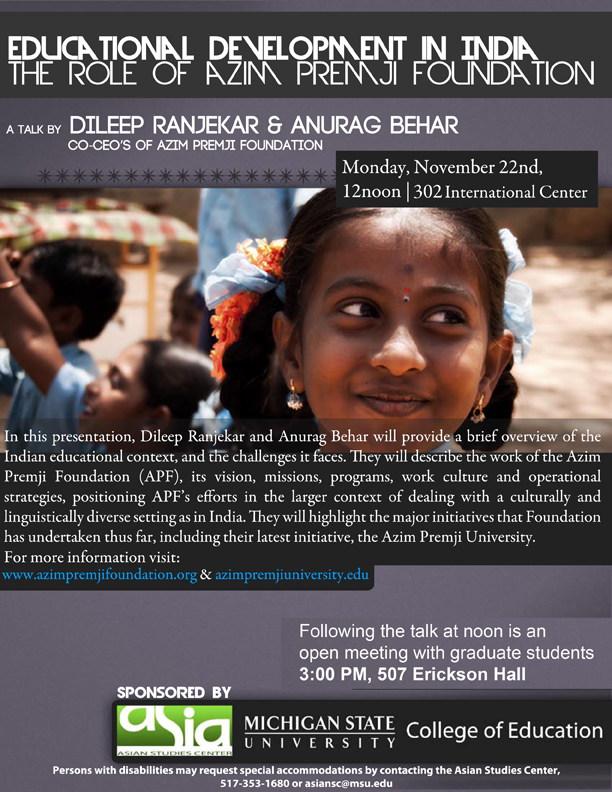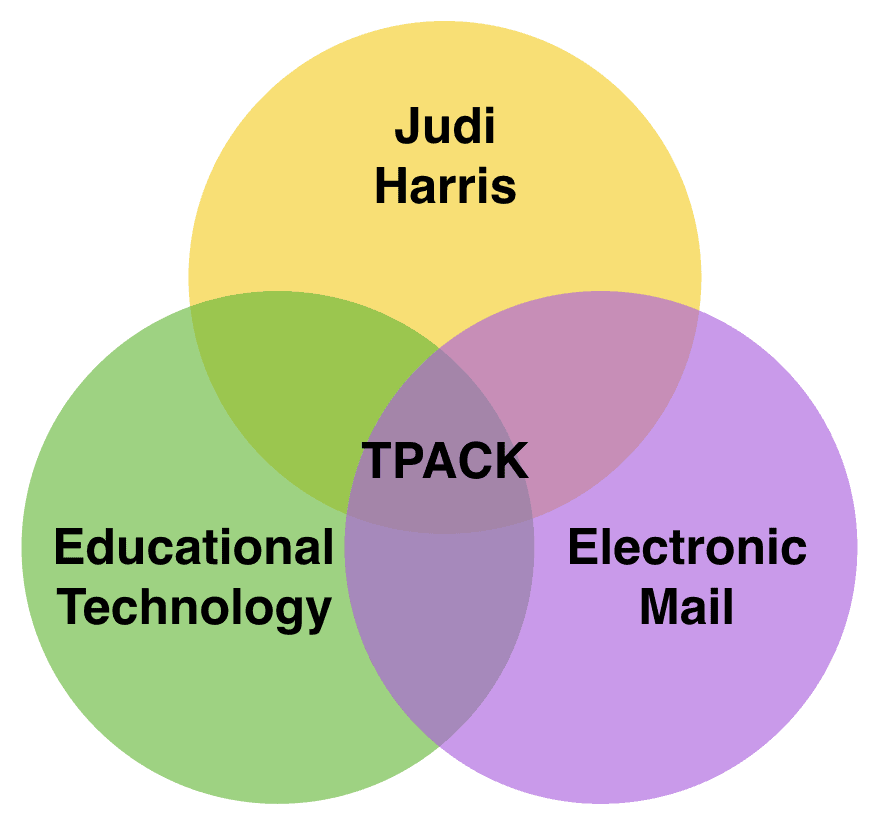Just before the Thanksgiving break, the College of Education and Michigan State University had the opportunity to host Dilleep Ranjekar and Anurag Behar, Co-CEO’s of the Azim Premji Foundation. The Azim Premji Foundation is a not-for-profit organization with a vision to “significantly contribute to achieve quality universal education that facilitates a just, equitable and humane society.” Operational since 2001, the APF employs over 200 professionals and 1000 paid volunteers in realizing this vision for elementary education in India. APF is currently engaged with over 2.5 million children, in 20,000 schools in partnership with 13 Indian States. The work of the foundation has been characterized by a strong emphasis on systemic reform of Indian education at all levels.
 |
|
| Anurag Behar | Dileep Ranjekar |
I met Dileep (and other members of the foundation) a couple of years ago, when I was in Bangalore for a conference (see here). Ever since then, I have been working on developing a partnership between MSU and the foundation. There have been visits by people from the foundation to East Lansing, as well as visits by us to the foundation offices in Bangalore. The recent visit by Ranjekar and Behar coincides with an important new initiative started by the foundation.
As a critical component of the Foundation’s strategy, Azim Premji University has emerged as an institution for learning and research in education and relevant development domains. Its focus is to develop education capacity and foster the development of professionals who are committed to social change. Working closely with the Foundation’s other education and development programs, the University seeks to significantly strengthen the connection between theory and practice. Key foci include: (a) Preparing a large number of committed education and development professionals who can significantly contribute to meeting the needs of the country; and (b) Building new knowledge in the areas of education and development through establishing a very strong link between theory and practice.
The past few days have been an exciting series of meetings and discussions around this partnership and I am glad to say that we appear to have made some important headway towards this. Of course there is a lot to be discussed / negotiated but I am excited by the possibility of the College of Education and the Foundation working together, both in the short-term and long-term.
While they were here, Dileep and Anurag made a presentation to the broader MSU community. This talk was sponsored by the College of Education and the Asian Studies Center. Details of the talk are given below, as well as a copy of the poster that was prepared and a link to the ppt presentation.
Educational development in India: The role of the Azim Premji Foundation [Download PPT]
Dileep Ranjekar & Anurag Behar. Co-CEO’s of Azim Premji Foundation
In this presentation, Dileep Ranjekar and Anurag Behar will provide a brief overview of the Indian educational context, and the challenges it faces. They will describe the work of the Azim Premji Foundation (APF), its vision, missions, programs, work culture and operational strategies, positioning APF’s efforts in the larger context of dealing with a culturally and linguistically diverse setting as in India and highlight the major initiatives that Foundation has undertaken thus far, including their latest initiative the Azim Premji University.
Poster




Yes, this is a good post without any doubts. You really doing a great Job. I inspired from you. So keep it up!!
Great work by Azim Premji Foundation on quality and equity education in India and introduce digital learning for students and educators. Digital learning is very helpful in easy learning and understanding.
I want to say that APF’s DLR work is good. I have gone through some of CDs sent to our school. Students enjoyed. Most of the teachers have not used these because they dont have much idea using computers. Presently at least 5% of the teachers are having knowledge on computers and can use these. I have got those CDs in 2007. At that time only few were interested. I suggest to try once again. Presently there are many websites which provide learning contents. like http://www.learnnext.com, meritnation.com etc. When compared with these there is good environment in APF’s works. Offcourse these websites are meant for the purpose of business. They are for sale of education.
A lot can be done bt these NGOs in India, I hope to see more corporates coming forward.
Refreshingly insightful and practical strategy to rebuild India by way of making a stunningly amazing dent in the educational system and demonstraing an alternative approach to rebuild young India. We done APF.